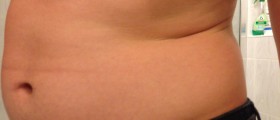
Perimenopause, also known as the menopausal transition is a stage in the women’s life in which she gradually enters the state of permanent infertility, also known as menopause. Perimenopause may start at different ages for different women. Normally, perimenopause starts in the early or mid forties, while it is not so unusual to notice the first signs of perimenopause during the 30s. Approaching menopause is usually announced by numerous symptoms such as hot flashes, sleep disturbances, dryness in the vaginal area, headaches, problems with digestion, frequent changes in emotional state and weight gain. Menopause can be officially declared when there has been absence of any menstruation for a period of 12 months. This is an extremely sensitive period in life of every woman. Women may understand these changes in different manners. For some of them it is a time of liberation and self-actualization, but for the others menopause is a medical condition. Weight gain during the perimenopause contributes to the way by which woman experiences the menopausal transition. In many cases, it severely distorts woman’s body image and lowers her self-esteem.
Causes of perimenopause weight gain
For great majority of women, stress and anxiety are the most important causes of weight gain. Perimenopause is a delicate period in which women becomes aware of the aging process and may sometimes develop different kind of complexes about the way she looks, about her age and her social status. Unmanaged stress often triggers overeating and, moreover, it affects the way body burns and stores fat.
Hormonal imbalance is another prominent symptom of perimenopause. At this stage of woman’s life, her estrogen levels significantly drop. One of the estrogen functions, however, is to store fat cells in the body. This way, when the hormonal levels drop, it becomes excessively hard to manage the body fat in the optimum level, and the woman starts gaining weight.
Managing and preventing perimenopause weight gain
Eating healthy and well balanced meals is important in every stage of life. Healthy diet is not only going to support one’s health and promote well-being, but it is also going to help an individual to look fit and slender, adding to one’s self-esteem. In a perimenopause, women should choose foods that promote estrogen levels in the body, such as potatoes, wheat, soy, cherries and rice.
Regular physical exercise is also important not only to shape the body but also to get relief from stress. Healthy habits such as yoga, breathing exercises, massage and aromatherapy may do the wonders in decreasing the stress levels and controlling weight gain.

















Your thoughts on this
Loading...